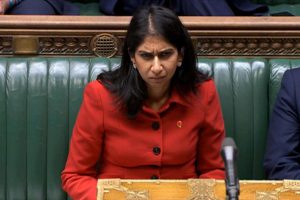WE live in a democracy.
In fact, we live in a particular type of democracy that is globally by far the most common form of democratic government.
We live in a representative parliamentary democracy in which those elected are not delegates, subject to the shifting whims of their electors.We elect councillors, MPs, and Senedd Members and then – by and large – their own partisan loyalties and individual judgements inform their decision-making.
We don’t elect sock puppets, though we elect the occasional Muppet.We get a chance to pass judgement on whether or not our representatives have done as we would’ve wanted (more or less) every few years at elections.
For those among Badger’s readers who despair at the policies and politics of the current Welsh and UK governments – or, more precisely, their postures and poses –neither commands the support of the majority of those who could be arsed to vote.
Badger was reminded of the effect turnout has on elections the other day while he scrolled through telly channels at random during a particularly dull evening in.
In 2016, the turnout in the United States Presidential Election was 55.7%. More than 40% of Americans did not vote.
Donald Trump’s share of the vote was 46.1% against 48.2% for Hilary Clinton.
Basic arithmetic demonstrates that less than 26% of Americans positively chose to elect Donald Trump as President of the USA.
That isn’t much of a mandate, but that’s how the system works in the US.
In the UK, the Conservative Party has an eighty-seats majority in the House of Commons.
The turnout in the 2019 General Election was 67.9%, and the Conservatives got 43.6% of the votes cast.
30% or so of those eligible to vote did so for the Boris Johnson-led Conservatives to form a government.
For the sake of completeness – and fairness – less than 22% wanted a Jeremy Corbyn-led Labour.
That means 48% of the electorate either did not vote or did not vote for either the Conservatives or Labour.
That is not much of a mandate, but that’s how the system works in Westminster elections.
If you delve into Welsh elections, the figures become starker.
In May 2021, 49.6% of those eligible to vote in the elections to the Senedd bothered to do so.
Of that 49.6%, 36.2% voted for Labour.
That means, under the Welsh electoral system, Labour’s ‘overwhelming mandate’ to govern Wales comes from a shade under 18% of those eligible to vote.
If you think that’s dismal, the principal opposition parties’ figures are even direr. Plaid barely scraped 10%, and the Conservatives – who celebrated a resurgence in support – got less than 12.5%.
To add clarity, Wales’s Government is no less legitimate than Westminster’s. Neither represents a majority of the available popular vote, and both were voted in after legally conducted elections.
There’s another issue this throws up, which should give thoughtful politicians and those interested in politics pause for thought.
When you see an opinion poll, the numbers always (within a level of minor statistical variation) total 100%.
When you factor in (for Westminster polls) a turnout of 68%, the accurate picture of public support or approval appears.
Imagine a poll that reported that 40% of 1,000 polled believed Boris Johnson was doing a good job. If the survey truly represented the electorate, only just over 2/3rds responding would vote. The more accurate picture would be that the number approving of Boris Johnson would be no more than 27% when projected across the whole electorate likely to vote at an election.
At such small numbers, and the numbers get even smaller when you get to local government elections, we can reasonably conjecture why politicians are viewed as disconnected from their electors.
And at the hyperlocal level – at Pembrokeshire County Council level – the numbers are so small – in terms of votes cast – that a well-organised, well-funded, and determined campaign would bring the odd rogue elephant to prominence.
It worked for Nigel Farage, who ran a massive con job on the UK electorate for years. Nigel Farage is a repellent, privileged chancer and serial electoral loser who has NEVER won a direct election under his name – not even to a Parish Council.
All of those of Badger’s readers who think Mark Drakeford, or Boris Johnson for that matter, leads a government without legitimacy should take a good hard look at Nigel Farage. He and UKIP are a premier example of how even vanishingly small popular support can translate into a public profile.
The turnout in the European elections that marked UKIP’s highwater mark was 35.6%. UKIP got 26.6% of the vote. That is less than 10% of those eligible to vote.
What that 9.5% of the votes bought was media exposure and the spotlight. It fed the false balance of news, where two extreme views are pitted against each other.
The middle view – and the possibility of consensus – is ignored.
That process doesn’t lead to political enlightenment; it plunges debate headlong into darkness and entrenches ignorance.
The last decade has brought to politics’ forefront the type of character who, in kinder and gentler times, would have been escorted from the bus stop where they’d been arguing with an empty crisp packet and housed forever after in a room without sharp corners.
Sometimes Badger looks at some of the comments on The Herald’s social media feed and feels he has stumbled into such a bus stop.
There, in the corner, chuntering away with a metaphorical can of Special Brew, someone is pouring out their howling ignorance and hatred onto the internet.Let’s call them “gremlins”.
You get enough gremlins on one social media thread, and you could despair and imagine that the loudest and most persistently ignorant represent the majority’s views.
Badger comforts himself that the political equivalent of someone drunkenly soiling themselves in public does not represent (even in some ironic sense) “the silent majority”.Bear that image in mind, readers, when considering the likes of Priti Patel, Dominic Raab, and Boris Johnson: the Special Brew Party.


















